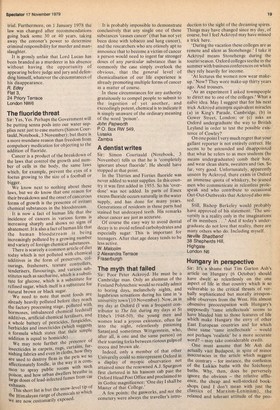The myth that failed
Sir: Poor Peter Ackroyd. He must be a Cambridge man. Only an alumnus of the Fenland Polytechnic would so readily admit to boring days, melancholy nights, and lugubrious sensations during his time in 'a university town'( 10 November). Now, as in my day at Oxford (I was a frequent contributor to The Isis during my days at St Ebbe's 1948-50), the young men and women lead a joyous existence, often far into the night, relentlessly pinioning Satan(and sometimes Wittgenstein, who, after all, is one and the same person) on their toasting forks between riotous gulps of cocoa and brown ale. Indeed, only a member of that other University could so misrepresent Oxford in a display of myopic observation not attained since the renowned A.J. Spurgeon first clattered in his hansom cab past the Oxford Head Post Office and proclaimed to its Gothic magnificence: 'One day I shall be Master of that College.' A few points: the gasworks, and not the cemetery were always the traveller's intro duction to the sight of the dreaming spires. Things may have changed since my day, of course, but I feel Ackroyd may have missed a trick here.
'During the vacation these colleges are as remote and silent as Stonehenge.' I take it Ackroyd means Stonehenge during the tourist season. Oxford colleges seethe in the summer with business conferences on which they rely heavily for income.
'At lectures the women now wear makeup.' Now? They wore make-up thirty years ago. And trousers.
'As an experiment I asked townspeople to direct me to one of the colleges.' What a naive idea. May I suggest that for his next trick Ackroyd attempts equivalent miracles (a) in King's Parade, Cambridge, (b) in Gower Street, London; or (c) asks an Oxford undergraduate the way to British Leyland in order to test the possible existence of Cowley? On one point I very much regret that your gallant reporter is not entirely correct. He seems to be astounded and disappoint:d that what he refers to as men students (he means undergraduates) comb their hair, and wear clean shirts, sweaters and ties. So far, very good. Unfortunately, apparently unseen by Ackroyd, there exists in Oxford an immense quota of whiskery, be-jeaned men who communicate in relentless prolespeak and who contribute to occasional Out-Out-Outbreaks that Ackroyd also missed.
Still, Bishop Berkeley would probably have approved of his statement: 'The university is a reality only in the imaginations of its members . . .' And if today's undergraduate do not love that reality, there are many others who do. Including myself. Neville Shadband 38 Shepherds Hill, Highgate London N6






































 Previous page
Previous page